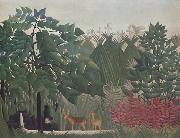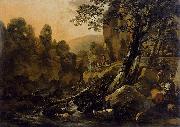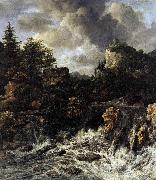Wholesale Oil Painting Reproductions No Minimum and Door to Door! |
|||||||||||
|
|
|||||||||||

|
|||||||||||
|
|
|
||||||||
All Henri Rousseau Oil Paintings |
||||||||
|
|
||||||||
|
|
||||||||
|
Artist Introduction: French
1844-1910
Henri Rousseau Locations
He was born in Laval in the Loire Valley into the family of a plumber. He attended Laval High School as a day student and then as a boarder, after his father became a debtor and his parents had to leave the town upon the seizure of their house. He was mediocre in some subjects at the high school but won prizes for drawing and music. He worked for a lawyer and studied law, but "attempted a small perjury and sought refuge in the army," serving for four years, starting in 1863. With his father's death, Rousseau moved to Paris in 1868 to support his widowed mother as a government employee. In 1871, he was promoted to the toll collector's office in Paris as a tax collector. He started painting seriously in his early forties, and by age 49 he retired from his job to work on his art. His wife died in 1888 and he later remarried.
Rousseau claimed he had "no teacher other than nature", although he admitted he had received "some advice" from two established Academic painters, Felix Auguste-Clement and Jean-Leon Gerome. Essentially he was self-taught and is considered to be a naive or primitive painter. |
||||||||
|
|
||||||||
|
The Waterfall Painting ID:: 27191 |
1910
mk15 |
|||||||
Height Width |
INS/CM Quality |
|||||||
|
X |
| |||||||
|
|
||||||||
All Nicolaes Pietersz. Berchem Oil Paintings |
||||||||
|
|
||||||||
|
|
||||||||
|
Artist Introduction: (1 October 1620 - 18 February 1683) was a highly esteemed and prolific Dutch Golden Age painter of pastoral landscapes, populated with mythological or biblical figures, but also of a number of allegories and genre pieces.
Born in Haarlem, he received instruction from his father Pieter Claesz, and from the painters Jan van Goyen, Pieter de Grebber, Jan Baptist Weenix, Jan Wils and Claes Cornelisz. Moeyaert.According to Houbraken, Carel de Moor told him that Berchem got his name from two words "Berg hem" for "Save him!", an expression used by his fellows in Van Goyen's workshop whenever his father chased him there with the intent to beat him. No trip or Grand Tour by Berchem was documented by Houbraken though he mentioned another story about the "Berg hem!" nickname which came from Berchem's conscription as a sailor; the man in charge of impressment knew him and sent him ashore with the words "Save him!".Today his name is assumed to come from his father's hometown of Berchem, Antwerp. According to the RKD he traveled to Italy with Jan Baptist Weenix, whom he called his cousin, in 1642-5. Works by him are signed both as "CBerghem" and "Berchem". |
||||||||
|
|
||||||||
|
|
The Waterfall Painting ID:: 82430 |
Date ca. 1665(1665)
Medium Oil on canvas
Dimensions Height: 110 cm (43.3 in). Width: 153 cm (60.2 in).
cjr |
||||||
Height Width |
INS/CM Quality |
|||||||
|
X |
| |||||||
|
|
||||||||
All Jacob van Ruisdael Oil Paintings |
||||||||
|
|
||||||||
|
|
||||||||
|
Artist Introduction: Dutch Baroque Era Painter, ca.1628-1682
Ruysdael's favorite subjects are simple woodland scenes, similar to those of Everdingen and Hobbema. He is especially noted as a painter of trees, and his rendering of foliage, particularly of oak leaf age, is characterized by the greatest spirit and precision. His views of distant cities, such as that of Haarlem in the possession of the marquess of Bute, and that of Katwijk in the Glasgow Corporation Galleries, clearly indicate the influence of Rembrandt.
He frequently painted coast-scenes and sea-pieces, but it is in his rendering of lonely forest glades that we find him at his best. The subjects of certain of his mountain scenes seem to be taken from Norway, and have led to the supposition that he had traveled in that country. We have, however, no record of such a journey, and the works in question are probably merely adaptations from the landscapes of Van Everdingen, whose manner he copied at one period. Only a single architectural subject from his brush is known--an admirable interior of the New Church, Amsterdam. The prevailing hue of his landscapes is a full rich green, which, however, has darkened with time, while a clear grey tone is characteristic of his seapieces. The art of Ruysdael, while it shows little of the scientific knowledge of later landscapists, is sensitive and poetic in sentiment, and direct and skillful in technique. Figures are sparingly introduced into his compositions, and such as occur are believed to be from the pencils of Adriaen van de Velde, Philip Wouwerman, and Jan Lingelbach.
Unlike the other great Dutch landscape painters, Ruysdael did not aim at a pictorial record of particular scenes, but he carefully thought out and arranged his compositions, introducing into them an infinite variety of subtle contrasts in the formation of the clouds, the plants and tree forms, and the play of light. He particularly excelled in the painting of cloudscapes which are spanned dome-like over the landscape, and determine the light and shade of the objects.
Goethe lauded him as a poet among painters, and his work shows some of the sensibilities the Romantics would later celebrate. |
||||||||
|
|
||||||||
|
|
The Waterfall Painting ID:: 95471 |
between 1665(1665) and 1670(1670)
Medium oil on canvas
cyf |
||||||
Height Width |
INS/CM Quality |
|||||||
|
X |
| |||||||
|
|
||||||||
|
Prev Next
|
||||||||
|
|
||||||||
|
Related Paintings to Jacob van Ruisdael :. |
||||||||
|
|
||||||||
|
CONTACT US |



